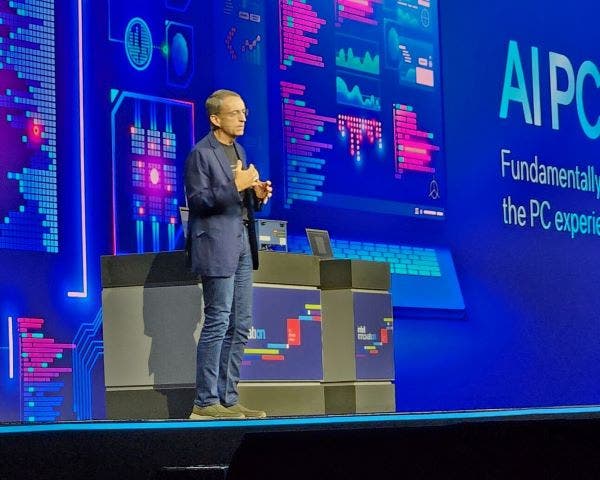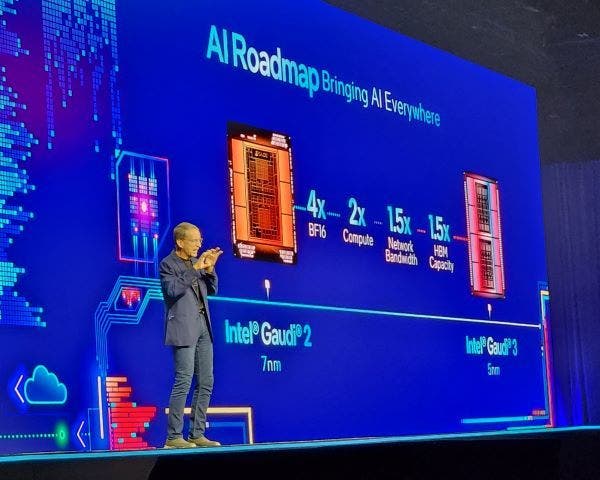6 Big Announcements At Intel Innovation 2023: From 288-Core CPU To AI Supercomputer
At the third annual Intel Innovation event, the semiconductor giant made several announcements related to AI and the broader field of computing, including December launch dates for new client and server CPUs, a plan to release a 288-core Xeon chip and a deal to build an AI supercomputer for Stability AI, among other things.

The biggest news from the third annual Intel Innovation event was all about how the chipmaker will challenge Nvidia and other rivals by seizing the next wave of AI opportunities in PCs, cloud computing and at the edge.
“AI represents a generational shift, giving rise to a new era of global expansion where computing is even more foundational to a better future for all,” said Intel CEO Pat Gelsinger in a statement provided ahead of the developer-focused conference happening Tuesday and Wednesday in San Jose, Calif.
[Related: Intel To ‘Usher Age Of AI PC’ With Core Ultra ‘Meteor Lake’ CPUs In December]
“For developers, this creates massive societal and business opportunities to push the boundaries of what’s possible, to create solutions to the world’s biggest challenges and to improve the life of every person on the planet,” he added.
The semiconductor giant made several announcements related to AI and the broader field of computing, including December launch dates for the new brand of Core Ultra laptop processors and the fifth-generation Xeon Scalable processors. The company also teased a monster 288-core Xeon CPU coming next year.
The Santa Clara, Calif.-based company also used the event to mark the launch of Intel Developer Cloud and disclose a plan to build a large AI supercomputer with Intel Xeon processors and 4,000 Intel Gaudi2 deep learning processors for AI model developer Stability AI.
Intel revealed a new commercial software platform, too, for building, running and managing edge infrastructure and applications.
What follows are summaries of these and other big announcements, including reveals around next-generation client CPUs, made by the chipmaker at Intel Innovation during the first day of festivities.

Intel’s AI-Focused Core Ultra ‘Meteor Lake’ CPU Arriving In December
Intel announced that its long-hyped Meteor Lake CPUs for laptops will launch Dec. 14 under the new Intel Core Ultra brand name.
The new processors will feature, for the first time in an Intel design, an integrated neural processing unit that will enable “power-efficient AI acceleration and local inference on the PC.”
They will also include “discrete-level graphics performance” thanks to their use of Intel Arc GPU technology for the processors’ integrated graphics.
Intel said the Core Ultra processors will provide a “balance of performance and power across AI-driven tasks” by taking advantage of the CPU, GPU and NPU for different tasks.
For instance, the CPU “has a fast response ideal for lightweight, single-inference low-latency AI tasks” while the NPU is a low-power AI engine best for “sustained AI and AI offload,” according to Intel.
Intel did not provide several key details for the Core Ultra processors, such as the specifications, the list of models or the pricing for volume purchases by channel partners.

Intel Shows Off Next-Gen Lunar Lake Chip, Teases Panther Lake For 2025
In his Intel Innovation keynote, Gelsinger surprised the audience with a computer development system running Lunar Lake, a next-generation client CPU expected for 2024 at the earliest.
“This is actually the world’s first showing of our Lunar Lake system. You didn’t see that coming,” he said.
Intel first teased Lunar Lake in 2022, saying that it would deliver “performance per watt leadership” using the Intel 18A manufacturing process and a process from a third-party foundry.
A company employee showed the Lunar Lake system running the Stable Diffusion model using local processing to generate an image from text in the open-source GIMP image editing program.
Gelsinger reiterated that Arrow Lake will succeed Meteor Lake in 2024, followed by Lunar Lake the same year or 2025, and then revealed that Arrow Lake’s successor, Panther Lake, will arrive in 2025.

5th-Gen Intel Xeon Scalable To Debut In December, 288-Core CPU To Follow
Intel said fifth-generation Xeon Scalable server processors will launch Dec. 14 and that a future generation coming next year will include a 288-core CPU.
The lineup, based on the Emerald Rapids architecture, is a direct successor to the fourth-generation Xeon Scalable processors that launched at the beginning of the year.
Intel said Emerald Rapids “will bring a combination of perrmance improvements and faster memory while using the same amount of power.”
While Emerald Rapids will use performance cores for processing applications, another generation of Xeon chips, code-named Sierra Forest, coming next year will use the efficiency cores that debuted in the 12th-generation Intel Core client CPUs.
The chipmaker said Sierra Forest will deliver 2.5 times better rack density and 2.4 times higher performance per watt over fourth-gen Xeon Scalable processors when the high-density processors arrive in the first half of 2024.
While Intel previously disclosed that Sierra Forest processors will go up to 144 cores, the company revealed on Tuesday that one will max out at a whopping 288 cores.
The successor to Emerald Rapids, code-named Granite Rapids, will also use performance cores and launch “closely” after Sierra Forest in 2024, according to the company. It added that Granite Rapids will offer two to three times better AI performance than fourth-gen Xeon.
The follow-up to Sierra Forest, code-named Clearwater Forest, will launch in 2025 and use the Intel 18A manufacturing process, Intel said.

Intel To Build Large AI Supercomputer For Stability AI
Intel said it plans to build a large AI supercomputer with Xeon Scalable processors and 4,000 Gaudi2 deep learning processors, and AI model startup Stability AI will serve as the anchor customer.
Gelsinger said the chipmaker believes the supercomputer will be the largest in Europe and among the world’s top 15 supercomputers when it’s completed.
Gelsinger called the supercomputer deal with Stability AI, the creator of the popular Stable Diffusion text-to-image model, a “major partnership” in its AI journey.
The company did not say when it will complete the supercomputer.
Intel’s Gaudi chips come from the company’s 2020 acquisition of Israeli startup Habana Labs, which was done to gain a significant edge against AI chip leader Nvidia.
“We’re not only rivaling the market leader” but doing so with “much better” total cost of ownership for deep learning models, Gelsinger said.
Gelsinger said the company’s next-generation deep learning chip, Gaudi3, will provide two times faster compute performance, four times faster bfloat16 performance, 1.5 times higher network bandwidth and 1.5 times greater high-bandwidth memory capacity.
He reiterated Intel’s plan to converge its data center GPU and Gaudi road maps with the Falcon Shores GPU, which will incorporate Gaudi technology and launch in 2025.
“Simply put, our roadmap is extremely robust, and we are executing aggressively to bring this together,” Gelsinger said.

Intel Developer Cloud Enters General Availability
Intel said its Intel Developer Cloud platform is now available for developers to test and deploy AI and high-performance computing applications with its latest CPUs, GPUs and AI accelerators.
Built on cloud infrastructure owned by Intel, the cloud platform will include access to the upcoming fifth-generation Xeon Scalable processors, Intel Data Center GPU Max Series and Intel Gaudi2 deep learning processors as well as Intel software and tools.
Access to fifth-gen Xeon Scalable processors, code-named Emerald Rapids, will become available in the next few weeks ahead of their December launch, according to Intel.
The chipmaker said Intel Developer Cloud will let developers build, test and optimize small- to large-scale AI training, model optimization and inference workloads as well as high-performance computing applications on its chips using Intel’s oneAPI programming model.
“Intel Developer Cloud provides hardware choice and freedom from proprietary programming models to support accelerated computing and code reuse and portability,” the company said.
Intel Reveals Commercial Edge Infrastructure Software Coming In 2024
Intel revealed a new commercial software platform that will “enable developers to build, deploy, run, manage connect and secure distributed edge infrastructure and applications.
Called Project Strata, the platform will launch in 2024, and it will come with “modular building blocks” as well as “premium service and support offerings.”
“It is a horizontal approach to scaling the needed infrastructure for the intelligent edge and hybrid AI and will bring together an ecosystem of intel and third-party vertical applications,” Intel said.